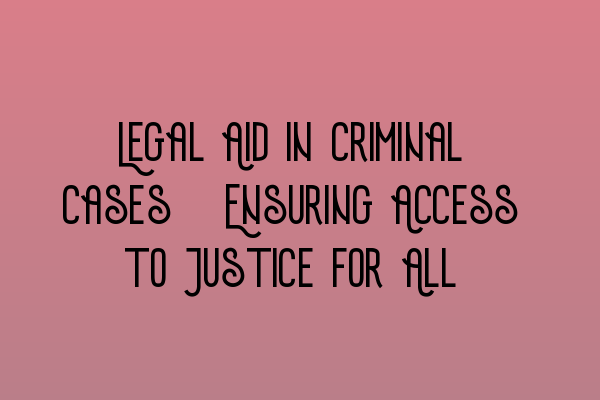Legal Aid in Criminal Cases: Ensuring Access to Justice for All
Providing legal aid to those who cannot afford legal representation is an essential aspect of any just and fair legal system. In criminal cases, where a person’s liberty and reputation are at stake, ensuring access to justice becomes even more paramount. In this blog post, we will explore the importance of legal aid in criminal cases and discuss the measures in place to guarantee its availability for all individuals, regardless of their financial capabilities.
The Role of Legal Aid
Legal aid serves as a crucial safeguard to ensure that everyone, regardless of their financial circumstances, has the means to seek legal representation. It promotes equality before the law and prevents the justice system from favoring the wealthy over the less privileged. Without legal aid, individuals who cannot afford legal representation would be at a significant disadvantage and may be unable to assert their rights effectively.
Fortunately, the United Kingdom recognizes the importance of legal aid in criminal cases. The government provides financial assistance to those who meet the eligibility criteria, ensuring that no one is left without access to justice solely due to their financial limitations.
Eligibility for Legal Aid
To qualify for legal aid in criminal cases, certain criteria must be met. The means test assesses an individual’s financial situation to determine their eligibility. Factors such as income, assets, and expenses are taken into account. Those who fall within the specified income thresholds may be eligible for full or partial legal aid.
Additionally, the merits test evaluates the strength of an individual’s case. It considers factors such as the seriousness of the offense and the potential consequences if convicted. This test ensures that legal aid is prioritized for cases where there is a genuine need for representation.
Challenges and Solutions
While legal aid is crucial, there are challenges that need to be addressed to ensure its effectiveness. Limited funding can sometimes result in a strain on resources, leading to delays and inadequate representation. However, steps are being taken to improve the system and overcome these challenges.
The Solicitors Qualifying Examination (SQE) offers aspiring solicitors the opportunity to gain the necessary skills and knowledge to navigate the legal aid system effectively. SQE 1 Preparation Courses and SQE 2 Preparation Courses provide comprehensive training to ensure solicitors are equipped to advocate for their clients successfully.
In addition, the availability of mock exams and practice quizzes, such as the SQE 1 Practice Exam Questions and SQE 1 Practice Mocks FLK1 FLK2, allows solicitors to refine their skills and familiarize themselves with the demands of criminal law cases.
It is crucial for solicitors to stay updated with the latest SRA SQE Exam Dates to ensure they are aware of any changes or updates in the legal profession. This knowledge allows them to provide accurate and timely advice to their clients, working towards the goal of ensuring access to justice for all.
Conclusion
Legal aid in criminal cases plays a vital role in upholding the principles of justice and fairness. It ensures that individuals, regardless of their financial situation, have the opportunity to seek legal representation and assert their rights effectively. Despite the challenges, the legal profession is constantly striving to improve access to justice for all. Through initiatives such as SQE training and practice resources, solicitors are better equipped to navigate the complexities of the legal aid system. By working together, we can continue to ensure that access to justice remains a fundamental right for all individuals.
For more information on SQE preparation and SRA exam dates, please visit our related articles:
- SQE 1 Practice Exam Questions
- SQE 1 Practice Mocks FLK1 FLK2
- SQE 2 Preparation Courses
- SQE 1 Preparation Courses
- SRA SQE Exam Dates
